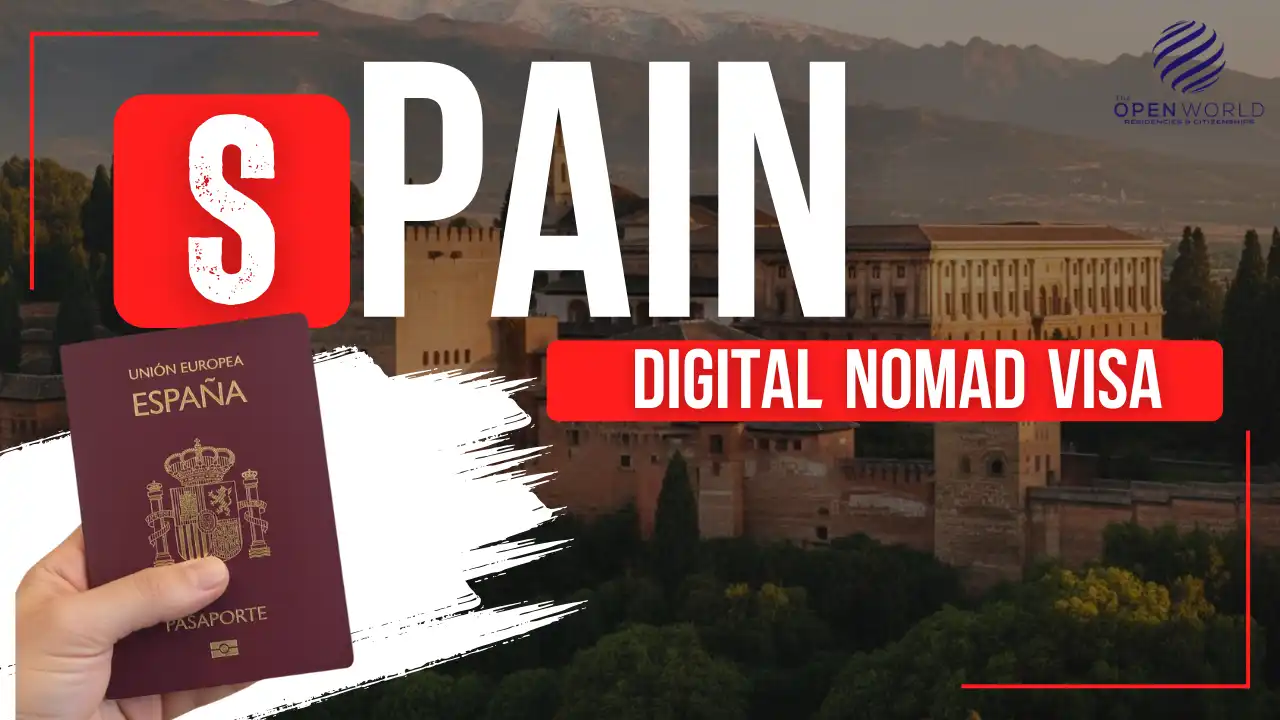Spain has become a dream destination for people who work remotely. In 2025, its Digital Nomad Visa (DNV) is one of Europe’s most trusted and attractive programs. First launched in 2023 under the Startup Law (Ley de Startups), the visa has now grown into a strong, easy-to-understand option for remote professionals.
If you’re a freelancer, entrepreneur, or remote employee, this visa lets you live and work legally in Spain for up to five years. You’ll enjoy residency benefits, freedom to travel across the Schengen Area, and a clear tax setup, all without needing to be hired by a Spanish company.
Why Spain’s Digital Nomad Visa Stands Out in 2025
Many European countries now have similar programs, but Spain’s version stands out for being simple and affordable. It’s backed by the Startup Act 28/2022, which gives it legal strength, and it has lower income requirements than Portugal or Italy.
According to Spain’s Tax Agency (Agencia Tributaria), individuals under the special expatriate tax regime, also known as the Beckham Law, can apply a 24% flat rate on income up to €600,000 for up to five years. The real star feature is the tax benefit. Digital nomads can pay a flat 24% income tax on earnings up to €600,000 under the updated Beckham Law. That’s a big difference compared to the normal resident tax rate, which can reach 47%. You can also include your spouse and dependents under the same application, which makes it perfect for families.
I remember when my close friend Sarah, a freelance designer from Canada, first moved to Valencia under this visa. She was nervous about how the taxes would work; she’d heard horror stories about complicated EU paperwork. But when she realized she only had to pay a flat 24% rate and didn’t need to register as a traditional business owner, she told me, “It feels like Spain actually wants me here.” That moment stuck with me because it showed how welcoming the system has become for people who just want to work remotely without endless red tape.
After five years of living in Spain, you can apply for permanent residency, and later, citizenship. This turns Spain’s visa into a real long-term opportunity, not just a temporary travel perk.
Updated Eligibility Criteria (2025)
To qualify for the Spain Digital Nomad Visa in 2025, you must be a non-EU citizen working remotely for a company outside Spain. You can do up to 20% of your work for Spanish clients, but most of your income should come from abroad.
You’ll need to prove a minimum monthly income of €2,700, plus an extra €1,000 for a spouse and €500 for each child. You must also show a valid work or freelance contract lasting at least one year, a clean criminal record for the last five years, and private health insurance that covers all of Spain.
These conditions make sure that applicants are financially stable and covered during their stay, but they’re still easier than in most other European countries.
Duration and Renewals
If you apply from outside Spain, your first visa is valid for one year. If you’re already in Spain (for example, on a tourist or student visa), you can convert it to a three-year residence permit.
You can renew the permit every two years, up to five years total. After that, you can move to permanent residency, and eventually citizenship after ten years, or just two years if you’re from Latin America, the Philippines, or Equatorial Guinea.
The renewal process has also been made easier thanks to Spain’s UGE-CE online platform, launched in 2024. It cuts waiting times from months to just a few weeks.
Tax Benefits for Digital Nomads
This is where Spain really shines. Thanks to the updated Beckham Law, digital nomads can choose to be taxed as non-residents for up to five years. This means a flat 24% tax rate on income up to €600,000, instead of the much higher progressive rates paid by residents.
Foreign income is mostly exempt from Spanish tax, and there’s no wealth tax under this regime. You only need to apply for this tax status within six months of becoming a resident.
To put it simply, you keep more of your money while enjoying the perks of living in one of Europe’s sunniest countries.
Cost Breakdown (2025)
Here’s what most applicants spend during the setup:
| Item | Estimated Cost | Notes |
|---|---|---|
| Visa application & consular fees | €75–€100 | One-time |
| Health insurance | €500–€1,000/year | Depends on the provider |
| Legal or translation help | €600–€1,200 | Optional |
| NIE (tax number) & registration | €10–€20 | Required |
| Renewal fees | €100–€150 | After the first year |
In total, most people spend under €2,000 to get started, excluding moving costs. That’s very reasonable for full legal residency in the EU.
Benefits of the Spain Digital Nomad Visa
With this visa, you can live and work legally in Spain, travel freely in the Schengen Area, and bring your family with you. You can also access Spanish healthcare, education, and even apply for long-term residence after five years.
It’s one of the few EU visas that truly offers a pathway to citizenship, not just a temporary stay. Combined with Spain’s relaxed lifestyle and modern infrastructure, it’s a smart choice for anyone looking to balance work and quality of life.
Lifestyle and Cost of Living
Spain is one of the most affordable countries in Western Europe, and you still get amazing weather, beaches, and culture.
| City | Average Rent (1-Bedroom) | Estimated Monthly Expenses (1 Person) |
|---|---|---|
| Madrid | €1,200 | €2,200 |
| Barcelona | €1,350 | €2,400 |
| Valencia | €950 | €1,800 |
| Málaga | €850 | €1,700 |
| Alicante | €700 | €1,600 |
Even in big cities, life costs less than in London or Paris. Outside the main hubs, places like Granada, Seville, or Tenerife offer even better value and a warm, welcoming vibe.
I have friends who moved to Valencia and say the best part isn’t just the low rent, it’s the lifestyle. You can work in the morning, grab lunch by the sea, and still enjoy live music at night.
Case Study – Software Engineer from the UAE
Let’s look at a real example. Khalid M., a 32-year-old engineer from Dubai, worked remotely for a Singapore-based company. In 2024, he applied for Spain’s Digital Nomad Visa through the Spanish Consulate in Dubai.
His visa was approved in three weeks, and he moved to Valencia with his wife and baby daughter. He now pays a flat 24% tax, works remotely, and travels freely across Europe.
Khalid says, “The process was smoother than I expected. Spain gave us the right mix of family life, weather, and a stable setup for remote work.”
Comparison with Other EU Digital Nomad Visas (2025)
| Country | Minimum Income | Validity | Tax Regime | Path to Residency |
|---|---|---|---|---|
| Spain | €2,700/month | 1 + 2 + 2 years | 24% flat rate (Beckham Law) | Yes (after 5 years) |
| Portugal | €3,280/month | 1 + 4 years | NHR regime (10 years) | Yes |
| Croatia | €2,400/month | 1 year max | Regular tax rates | No |
| Italy | €2,500–3,000/month | 1 year (renewable) | 15% special regime (5 years) | Yes |
Spain’s option is one of the most balanced, low-income requirement, fair tax, and a clear path to staying long-term.
Potential Challenges
Like any visa, there are a few challenges. Different consulates may have slightly different processing times. Freelancers with irregular income might face extra checks. Setting up a Spanish bank account or tax ID (NIF) can also take a bit of patience.
It’s wise to work with a legal or relocation expert who knows the process well. This can save time and help you avoid small but annoying mistakes.
Expert Insight
“Spain’s Digital Nomad Visa has matured into a long-term residency solution, not just a passing trend,” says Charlie Maggi, CEO of The Open World. “It’s especially popular with professionals from the UAE, India, and Latin America who want an approachable EU base with strong tax benefits.”
Outlook for 2026
Spain plans to make things even smoother. Online renewals and digital residence cards with biometric features are being tested. This could remove the need for in-person visits for renewals. The government is also exploring agreements with partner countries to make it easier for foreign tech and creative workers to relocate.
Final Thoughts
By 2025, Spain’s Digital Nomad Visa isn’t just a new experiment , it’s a core part of the country’s innovation and talent strategy. It offers affordability, clear rules, and a great lifestyle.
For remote workers dreaming of European living without giving up their jobs or freedom, Spain’s program is the gold standard. It’s flexible, family-friendly, and perfectly designed for today’s global workforce.
Ready to Start Your Journey?
Work remotely from sunny Spain with confidence. Get expert help securing your Digital Nomad Visa and start your Spanish adventure today with The Open World!
FAQs
1. How long can I stay in Spain with the Digital Nomad Visa?
You can stay for up to five years if you keep meeting the conditions. The first permit lasts one year (or three years if you apply from inside Spain), and you can renew it every two years. After five years, you can apply for permanent residency.
2. Can I bring my family with me?
Yes, absolutely! You can include your spouse and children in your application. You just need to show a higher income , about €1,000 more per month for a spouse and €500 per child.
3. Do I have to pay taxes in Spain?
Yes, but the good news is you can choose the special Beckham Law regime for digital nomads. That means you pay a flat 24% income tax on income up to €600,000 and don’t need to pay taxes on most foreign income.
4. How much money do I need to qualify?
The minimum monthly income is €2,700 for the main applicant. This ensures you can live comfortably without needing local work. If you add family members, the amount increases slightly.
5. Can I work for Spanish clients while living there?
Yes, but only up to 20% of your total work can come from Spanish clients. The main goal of this visa is to support remote workers employed or contracted by companies outside Spain.




